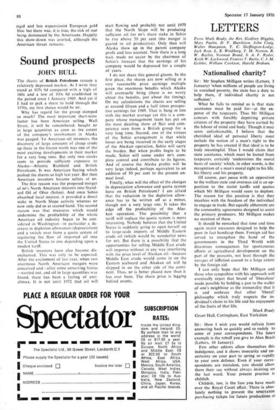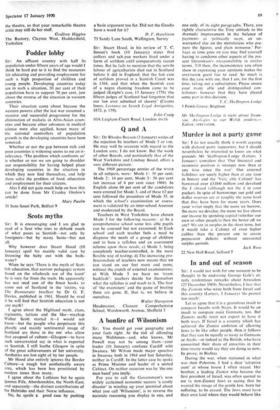LETTERS
From Mark Brady, the Rev. Godfrey Higgins, Mary Paulin, D. F. Hutchison, John Craig, Walter Hampston, T. C. Skeffington-Lodge, Jack Ross, L. E. Weidberg, T. M. Norton, R. W. Bayliss, Norman Brand, S. A. F. Ryder, Keith W. Lockwood, Frances T. Burke, C. J. M. Gebbie, William Cookson, Harold Braham.
Nationalised charity?
Sir: Mr Stephen Milligan writes (Letters, 3 January) 'when millions of people are living ' in wretched poverty, the state has a duty to help them, if individual charity is not sufficient'.
What he fails to remind us is that state assistance must be paid for—at the ex- pense of the taxpayers. Thus Mr Milligan concurs with forcibly depriving private citizens of the property they have earned by the labour of mind and body. Though it may seem unfashionable, I believe that the cherished ideal of personal liberty must include the notion of a man's right to the property he has created if that ideal is to be truly meaningful. Thus I would claim that state assistance, which must be looted from taxpayers, certainly 'undermines the moral basis of society' which, in other words, is the recognition of a man's moral right to his life, his liberty and his property.
Of course, pari passu with an opposition to the welfare state and overseas aid is an op- position to the statist tariffs and quotas which Mr Milligan would seem to deplore. The reason for this position is that they interfere with the freedom of the individual to engage in trade. But equally abhorrent are the commodity agreements designed to assist the primary producers. Mr Milligan makes no mention of these.
It should be remarked that time and time again statist measures designed to help the poor in fact handicap them. Foreign aid has served to strengthen the hand of the governments in the Third World with disastrous consequences for spontaneous efforts at agricultural development on the part of the peasants, not least through the ravages of inflation caused to a large extent by the foreign aid.
I can only hope that Mr Milligan and those who sympathise with his approach will eventually reject that brand of 'liberalism' made possible by holding a gun to the wallet of one's neighbour as the immorality that it is and embrace that other 'liberal' philosophy which truly respects the in- dividual's claim to his life and his enjoyment of the fruits of that life.
Mark Brady Grant Hall, Cottingham, East Yorkshire Sir: How I wish you would refrain from answering back so quickly and so rudely to some of your correspondents. The latest example is the rebuff you give to Alan Brash (Letters, 10 January).
Few other editors allow themselves this indulgence, and it shows insecurity and un- certainty on your part to spring so rapidly to your own defence. Even if your corre- spondents are mistaken, you should allow them their say without always insisting on the last word. Your present practice is childish.
Childish, too, is the fuss you have made over the Royal Court affair. There is abso- lutely nothing to prevent the SPECIATOR purchasing tickets for future productions at
the theatre, so that your remarkable theatre critic may still do her stuff.
Godfrey Higgins The Rectory, Clayton West, Huddersfield, Yorkshire



































 Previous page
Previous page